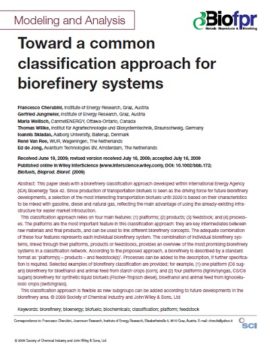Toward a common classification approach for biorefinery systems
 Toward a common classification approach for biorefinery systems
Toward a common classification approach for biorefinery systems
This paper deals with a biorefinery classification approach developed within International Energy Agency (IEA) Bioenergy Task 42. Since production of transportation biofuels is seen as the driving force for future biorefinery developments, a selection of the most interesting transportation biofuels until 2020 is based on their characteristics to be mixed with gasoline, diesel and natural gas, reflecting the main advantage of using the already-existing infrastructure
for easier market introduction.
This classification approach relies on four main features: (1) platforms; (2) products; (3) feedstock; and (4) processes. The platforms are the most important feature in this classification approach: they are key intermediates between raw materials and final products, and can be used to link different biorefinery concepts. The adequate combination of these four features represents each individual biorefinery system. The combination of individual biorefinery systems,
linked through their platforms, products or feedstocks, provides an overview of the most promising biorefinery systems in a classification network. According to the proposed approach, a biorefinery is described by a standard format as ‘platform(s) – products – and feedstock(s)’. Processes can be added to the description, if further specification is required. Selected examples of biorefinery classification are provided; for example, (1) one platform (C6 sugars) biorefinery for bioethanol and animal feed from starch crops (corn); and (2) four platforms (lignin/syngas, C5/C6 sugars) biorefinery for synthetic liquid biofuels (Fischer-Tropsch diesel), bioethanol and animal feed from lignocellulosic crops (switchgrass).
This classification approach is flexible as new subgroups can be added according to future developments in the biorefinery area.
Cherubini – 2009 – Toward a common classification approach for biorefinery systems


